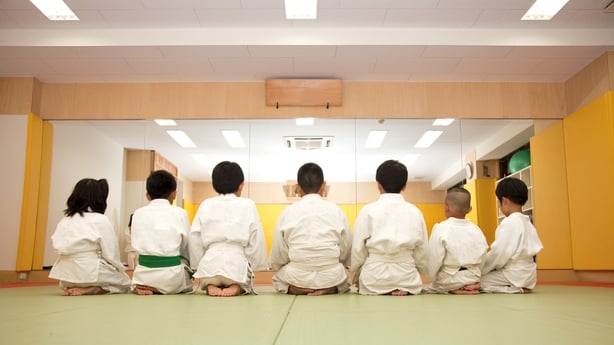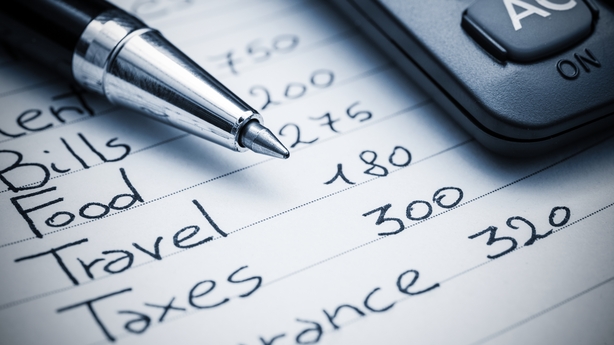While the initial back-to-school expenses of uniforms and new shoes may be out of the way for another year, the cost of after-school activities is building for many households.
From music classes to swimming lessons, some parents are forking out hundreds of euro per child every term.
But as the cost of heating, electricity and other essentials continues to spiral, many parents are being forced to make some tough decisions.
Amy Dutton from Co Wicklow has a daughter in primary school and a son in secondary school.
She said prices have increased across all their extracurricular activities compared to last year.
Martial arts classes for her 12-year-old son have increased from €18 a month to €21 for a one-hour class every week, while pay-as-you-go classes for her eight-year-old daughter are up from €5 to €8.
While she said the GAA membership for her daughter is quite reasonable at €40 per year, the fee has doubled compared to last year.
This means the family will be spending over €600 this year on after-school activities, up over €150 on last year - for the same activities.
Ms Dutton had wanted to enroll the children in more activities this year but said that is now not an option due to rising costs.
"As a parent of two active children it's very upsetting not to be able to allow them to attend activities more frequently," she said.
"They have the option of doing two martial arts classes a week, but with both currently attending one class per week it's already a stretch.
"GAA is finished for the winter now and we'd love them to both have two evenings that they're active, but it's just not an option for us," she said.
Ms Dutton said they've noticed all their expenses rising over the past year and they're feeling the pressure.
"All bills are increasing from gas and electricity, the food shop - to even our annual bin charges which have gone from €50 annually to €85," she said.

Phil Kelly from Co Dublin has three children aged nine, two and one.
Music lessons for his two-year-old have increased from €150 per term last year to €255 this year.
This means the family is now spending over €700 per year on lessons, compared to €450 last year.
He said part of that is down to the fact that his two-year-old has moved from the baby group to the toddler class - but nonetheless, that is a big price increase.
"I would love to have the two younger children both in music classes but unfortunately we can't afford it," Mr Kelly said.

He said the cost of GAA activities for his nine-year-old has also increased, while the price of softball activities has remained the same as last year.
In total, the family is spending over €1,300 per year on extracurricular activities for two children.
"The eldest would also like to do horse riding but we can't afford that.
"It's hard to say no to a child due to purely financial reasons outside our control," he added
According to a recent survey carried out by the Irish League of Credit Unions (ILCU), many parents are cutting back on such spending this year, due to the cost-of-living crisis.
67% of parents surveyed said they will be forced to deny their children extracurricular activities because they can't afford them. That is up from 46% last year, a jump of 21%.
Meanwhile, 34% said they can’t afford to buy new gym gear for their child, while 24% can’t afford new shoes.

When asked what other options they would consider to help manage household costs, 31% of parents said they would look at trying to earn additional income.
23% said they would consider taking out a personal loan, while 14% said they would think about asking family or friends for a loan.
9% of parents are also considering looking for debt or budgeting advice.
Paul Bailey, Head of Communications with the ILCU, said their research suggests that more parents are taking out loans in order to fund back-to-school costs, and after-school activities.
"More than one in four of parents are getting into debt to cover the costs of back to school with 21% having debts over €500," he said.
"The average debt parents find themselves in is €339," he added.

The Money Advice and Budgeting Service, known as MABS, provides free support for those looking for advice on money, budgeting and debt.
Karl Cronin, Regional Manager at MABS for North Connacht and Ulster, said they have seen a notable increase in the number of callers to their helpline and their offices over the last two months.
The MABS Helpline is open from Monday to Friday from 9am to 8pm on 0818 07 2000.
Mr Cronin said the helpline is staffed with a team of fully trained advisers who will carry out an assessment with the caller and work out the best course of action.
"This may lead to a referral to a MABS office in the callers' local area for a face-to-face appointment for a more in-depth review of the financial situation," he said.
"The MABS service is completely free, confidential, independent and non-judgemental," he added.
Top tips from MABS
If you're struggling to manage your finances, Mr Cronin said the first step is to draft an accurate and realistic budget.
"A well-planned budget will help you to organise the money coming in and going out and to plan for bills, unexpected expenses and to save for special events," he said.
"It also ensures you are in control of your finances and not over-spending," he added.
Given the increase in day-to-day expenses, Mr Cronin said it is now more important than ever to keep a close eye on your budget and review it regularly.
"And remember, a well-balanced budget should include some treats and things to look forward to - a budget is a tool, not a punishment," he added.

When it comes to cutting back on spending, Mr Cronin said he would suggest parents make a list of their total expenditure - both essential and discretionary.
"The priority expenses for any household are accommodation costs, such as the monthly mortgage repayment or rent, food, heat, electricity and medical expenses. Following that, transport and education are important," he said.
Once you have a clear and accurate picture of all your outgoings, Mr Cronin said you can look at your discretionary expenditure, and decide if there is scope to reduce this.
He acknowledged that cutting back on things such as extracurricular activities can be very difficult for parents.
"Parents can feel immense pressure to have their children involved in everything, from sports to music lessons, dance classes to horse-riding and everything in between," he said.
"Not alone does this cause financial pressure, but it creates an extra stress for parents who find themselves running from A to B several evenings a week while trying to fit in dinnertimes and homework. There is a transport cost to factor in here too," he added.
Mr Cronin said he would advise parents to have a conversation with their children.
"Ask them which activity they enjoy the most and cut back accordingly," he suggested.

The National Parents Council Post Primary (NPCPP) works on behalf of parents and young people in post-primary education.
Its Communications Director, Paul Rolston, has called on schools, educational facilities, clubs and community organisations to be supportive of parents who may be struggling financially.
"None should discriminate against any child, adolescent or family on the basis that they are unable to pay," he said.
"In particular NPCPP calls for all schools and community organisations not to withdraw facilities or activities from children and students - and no young person should be identifiable to their peers or others because parents cannot afford a service or activity."
"This is a time for communities to stand together and support our most vulnerable - a time for leaders in society to demonstrate respect and understanding," he added.
Mr Rolston also said he would encourage parents to explore the free activities available in their area.
"We'd like to remind everyone that there are many activities available around our beautiful countryside which offer opportunities for activities, exercise and social interaction free or for minimal charge," he added.







